Juan Pablo Gomez
PhD, Graduated Spring 2016, now postdoc fellow in Gainesville, FL.
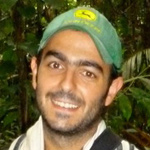 Species interact with the environment and with other species through their functional traits. However, species and, ultimately, functional traits are the result of an evolutionary history that can also be responsible for the diversity patterns observed. Thus, our understanding of how biological diversity arises and is maintained can greatly benefit from methods that specifically include the distribution of functional traits within and among assemblages and the evolutionary history of the species incorporating a phylogenetic measure of biodiversity. For these reasons, I am generally interested in bridging community ecology and evolution by integrating the evolutionary history of the species and their traits with traditional studies on community composition. I believe that in this way we will be able to propose community assembly rules in order to understand the high diversity of the neotropics. Visit Juan Pablo’s web site >
Species interact with the environment and with other species through their functional traits. However, species and, ultimately, functional traits are the result of an evolutionary history that can also be responsible for the diversity patterns observed. Thus, our understanding of how biological diversity arises and is maintained can greatly benefit from methods that specifically include the distribution of functional traits within and among assemblages and the evolutionary history of the species incorporating a phylogenetic measure of biodiversity. For these reasons, I am generally interested in bridging community ecology and evolution by integrating the evolutionary history of the species and their traits with traditional studies on community composition. I believe that in this way we will be able to propose community assembly rules in order to understand the high diversity of the neotropics. Visit Juan Pablo’s web site >
Judit Ungvari Martin
PhD, Graduated Spring 2016, now postdoc fellow in Washington, DC.

After working in several different research labs and exploring aspects of empirical population genetics in Rhabditid nematodes and learning the tools of molecular biology using sucking lice, I finally get to focus on my own graduate research project. I am broadly interested in avian biology and as an undergraduate I have studied nestling growth and feeding behavior of adult birds and the effects of urbanization on birds. My general research interests for my graduate work are ecology, evolution, and species interactions in tropical bird communities, in particular movements and habitat specialization of birds living on patches along environmental gradients. Currently, I work in white sand forests around Iquitos, Peru. These forests are called “varillales”, they are patchily distributed and they grow on extremely nutrient poor white sand soils. They are stunted forests, and have a very unique vegetation composition with several endemic plants. The bird community is also different from the surrounding clay soil based upland rainforests’ bird communities, with several habitat specialists species that exhibit different degrees of specialization for this forest type or poor soils in general. Visit Judit’s web site >
Carrie Vath
PhD, Graduated Spring 2014, now in Montana.
I am inte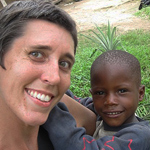 rested in using a holistic approach (blending the natural and social sciences; my background is in Zoology and Biological Anthropology) to understand applied conservation. I believe that without local support sustainable conservation is not possible. My dissertation work focuses on community member’s conservation attitudes and behaviors in Cross River State Nigeria. Specifically, I work with local hunters to understand their hunting patterns, bushmeat selection processes and off-take, and their conservation ethic. In addition, I study how non-hunter community members (women, men, children, and chiefs) view protected areas, conservation laws, and local NGOs working in the area. My areas of interest include: Primate Conservation, Environmental Education, Theories of Conservation Behaviors in humans, Natural Resource Management, and Livelihood Projects (Economic-community-based conservation, Protein-wild and domestic livestock farming, and Environmental Sustainability- fuel efficient stoves, family planning, etc.).
rested in using a holistic approach (blending the natural and social sciences; my background is in Zoology and Biological Anthropology) to understand applied conservation. I believe that without local support sustainable conservation is not possible. My dissertation work focuses on community member’s conservation attitudes and behaviors in Cross River State Nigeria. Specifically, I work with local hunters to understand their hunting patterns, bushmeat selection processes and off-take, and their conservation ethic. In addition, I study how non-hunter community members (women, men, children, and chiefs) view protected areas, conservation laws, and local NGOs working in the area. My areas of interest include: Primate Conservation, Environmental Education, Theories of Conservation Behaviors in humans, Natural Resource Management, and Livelihood Projects (Economic-community-based conservation, Protein-wild and domestic livestock farming, and Environmental Sustainability- fuel efficient stoves, family planning, etc.).
Ari Martinez
PhD, Graduated Spring 2013, now NSF postdoc fellow at SFSU in San Francisco, California.
I am g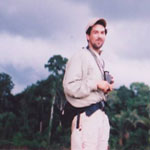 enerally interested in building bridges between ecology and conservation by addressing the maintenance of species diversity in managed forests (i.e., timber extraction) in the neotropics. More specifically, I am focusing on neotropical mixed-species flocks as species modules to assess the relative importance of species interactions such as mutualism and competition in shaping community structure. By using both experimental and observational approaches, I will assess the roles of different core flock species in influencing the cohesiveness of flocks and the dynamics of species interactions among flock members. In the context of managed forest landscapes, modification of habitat structure (through primary and secondary impacts of timber extraction) is expected to change the nature of species interactions among flock members and hence the cohesion and organization of flocks. By exploring the dynamics of species interactions and its consequences for flock cohesion, I intend to use a stable and predictable group of interacting species as an indicator of the degree of intervention in managed forests. Sufficient insights on a mechanistic level should enable the construction of ecological models that predict changes in species interactions as a function of a) the level of impacts generated by the primary and secondary impacts of timber extraction b) the habitat conditions under which it is advantageous to flock.
enerally interested in building bridges between ecology and conservation by addressing the maintenance of species diversity in managed forests (i.e., timber extraction) in the neotropics. More specifically, I am focusing on neotropical mixed-species flocks as species modules to assess the relative importance of species interactions such as mutualism and competition in shaping community structure. By using both experimental and observational approaches, I will assess the roles of different core flock species in influencing the cohesiveness of flocks and the dynamics of species interactions among flock members. In the context of managed forest landscapes, modification of habitat structure (through primary and secondary impacts of timber extraction) is expected to change the nature of species interactions among flock members and hence the cohesion and organization of flocks. By exploring the dynamics of species interactions and its consequences for flock cohesion, I intend to use a stable and predictable group of interacting species as an indicator of the degree of intervention in managed forests. Sufficient insights on a mechanistic level should enable the construction of ecological models that predict changes in species interactions as a function of a) the level of impacts generated by the primary and secondary impacts of timber extraction b) the habitat conditions under which it is advantageous to flock.
Gustavo Londoño
PhD, Graduated Spring 2013, postdoc at UC Riverside, now professor at ICESI in Cali, Colombia.
I am 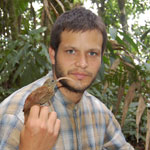 interested in the natural history, ecology and life history of birds, with a particular interest in the factors that influence bird incubation behavior. Specifically, I am interested in how bird incubation behavior is determined by intrinsic and extrinsic factors. My current research focuses on neo-tropical bird species, for which many nests have not yet even been described. Therefore, we have a poor understanding on factors that affect bird incubation behavior in neo-tropical areas. Additionally, I am interested in the ways in which the three main bird incubation components (nests, eggs and incubating birds) interact and contribute to intra and interspecific variation in incubation behavior. I will address this problem from three different perspectives by integrating behavioral, ecological and physiological approaches.
interested in the natural history, ecology and life history of birds, with a particular interest in the factors that influence bird incubation behavior. Specifically, I am interested in how bird incubation behavior is determined by intrinsic and extrinsic factors. My current research focuses on neo-tropical bird species, for which many nests have not yet even been described. Therefore, we have a poor understanding on factors that affect bird incubation behavior in neo-tropical areas. Additionally, I am interested in the ways in which the three main bird incubation components (nests, eggs and incubating birds) interact and contribute to intra and interspecific variation in incubation behavior. I will address this problem from three different perspectives by integrating behavioral, ecological and physiological approaches.
Jill Jankowski
PhD, Graduated Summer 2010, now at The University of British Columbia, Vancouver, Canada.
One of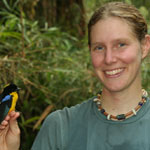 the most important challenges facing tropical ecologists and conservationists is to understand how species composition of communities changes across heterogeneous landscapes. Tropical altitudinal gradients exemplify such landscapes, and in the Neotropics, montane regions are important storehouses of biodiversity. My research focuses on describing the structure and organization of montane bird communities in Manu National Park, Peru, and in Monteverde, Costa Rica. Within these two regions, I am identifying levels and patterns of species turnover (also known as beta diversity) in avian communities along altitudinal gradients and using census data and experiments for various target species (e.g, from Henicorhina, Catharus, Scytalopus, Thripadectes) to test alternative ecological mechanisms that could limit altitudinal distributions. In particular, my studies of range limits focus on species that show “altitudinal replacements” or parapatric distributions with congeners along gradients, and test whether these species are limited in their altitudinal distribution by interspecific competition, or alternatively, specialization to particular habitats in montane landscapes. One goal for my research is to determine how the relative strength of ecological factors limiting species could be dependent upon underlying characteristics of gradients and patterns of species distributions. Another research goal is to use these census data of avian communities as a basis for long-term monitoring of populations and evaluating future climate change scenarios in tropical montane regions.
the most important challenges facing tropical ecologists and conservationists is to understand how species composition of communities changes across heterogeneous landscapes. Tropical altitudinal gradients exemplify such landscapes, and in the Neotropics, montane regions are important storehouses of biodiversity. My research focuses on describing the structure and organization of montane bird communities in Manu National Park, Peru, and in Monteverde, Costa Rica. Within these two regions, I am identifying levels and patterns of species turnover (also known as beta diversity) in avian communities along altitudinal gradients and using census data and experiments for various target species (e.g, from Henicorhina, Catharus, Scytalopus, Thripadectes) to test alternative ecological mechanisms that could limit altitudinal distributions. In particular, my studies of range limits focus on species that show “altitudinal replacements” or parapatric distributions with congeners along gradients, and test whether these species are limited in their altitudinal distribution by interspecific competition, or alternatively, specialization to particular habitats in montane landscapes. One goal for my research is to determine how the relative strength of ecological factors limiting species could be dependent upon underlying characteristics of gradients and patterns of species distributions. Another research goal is to use these census data of avian communities as a basis for long-term monitoring of populations and evaluating future climate change scenarios in tropical montane regions.
Christine Stracey Richard
PhD, Graduated in Spring 2010, now at Westminster College, Salt Lake City, Utah.
My main objec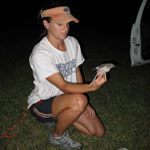 tive is to try to understand how wildlife/nature work in urban areas. To do this I compare populations of bird species that live in town with those that live in the country. I’m focusing mostly on the Northern Mockingbird – a species that is more abundant in town than in rural areas – to test the hypotheses that 1) nest predation rates are reduced in town and 2) there are more food resources in town.
tive is to try to understand how wildlife/nature work in urban areas. To do this I compare populations of bird species that live in town with those that live in the country. I’m focusing mostly on the Northern Mockingbird – a species that is more abundant in town than in rural areas – to test the hypotheses that 1) nest predation rates are reduced in town and 2) there are more food resources in town.
Curso de campo
Our lab formerly taught a research design field course to Latin American students about topics relevant to ecology and conservation. Students have come from Peru, Colombia, Argentina, Bolivia and Ecuador to participate in this intensive 10-day field experience that leads to new skills, international collaborations and long lasting camaraderie. Visit course website